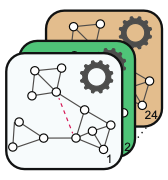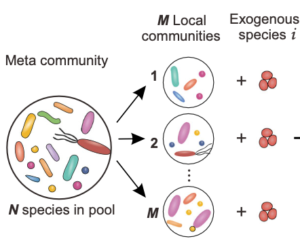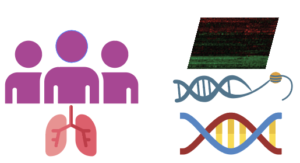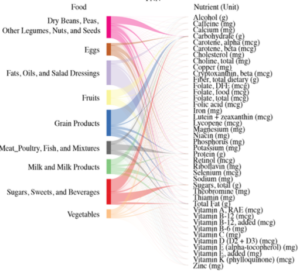Network Science
 The focus of this research is on understanding complex biological systems through the lens of network science. By building and analyzing biological networks, such as protein-protein interaction networks, we aim to uncover hidden relationships and key elements that drive biological processes. This approach allows us to explore how networks of genes and proteins relate to various phenotypes and disease outcomes, ultimately offering insights that could guide targeted therapeutic interventions.
The focus of this research is on understanding complex biological systems through the lens of network science. By building and analyzing biological networks, such as protein-protein interaction networks, we aim to uncover hidden relationships and key elements that drive biological processes. This approach allows us to explore how networks of genes and proteins relate to various phenotypes and disease outcomes, ultimately offering insights that could guide targeted therapeutic interventions.
-
-
-
-
- Wang, Xu-Wen, Lorenzo Madeddu, Kerstin Spirohn, Leonardo Martini, Adriano Fazzone, Luca Becchetti, Thomas P. Wytock et al. Assessment of community efforts to advance network-based prediction of protein–protein interactions. Nature communications 14, no. 1 (2023): 1582.
- Wang, Xu-Wen, Dandi Qiao, Michael H. Cho, Dawn L. DeMeo, Edwin K. Silverman, and Yang-Yu Liu. A statistical physics approach for disease module detection. Genome Research 32, no. 10 (2022): 1918-1929.
-
-
-
Community Ecology
 In this research area, we study the interactions between microbial species and their environments, particularly within the human body. Our work uses ecological and deep learning tools to understand the structure and function of microbial communities in different contexts. This research aims to reveal how microbial interactions contribute to outcomes, providing a foundation for microbiome-based therapeutic strategies.
In this research area, we study the interactions between microbial species and their environments, particularly within the human body. Our work uses ecological and deep learning tools to understand the structure and function of microbial communities in different contexts. This research aims to reveal how microbial interactions contribute to outcomes, providing a foundation for microbiome-based therapeutic strategies.
-
-
-
-
- Wang, Xu-Wen, Zheng Sun, Huijue Jia, Sebastian Michel-Mata, Marco Tulio Angulo, Lei Dai, Xuesong He, Scott T. Weiss, and Yang-Yu Liu. Identifying keystone species in microbial communities using deep learning. Nature Ecology & Evolution 8, no. 1 (2024): 22-31.
- Lu, Wu, Wang, Xu-Wen, Zining Tao, Tong Wang, Wenlong Zuo, Yu Zeng, Yang-Yu Liu, and Lei Dai. Data-driven prediction of colonization outcomes for complex microbial communities. Nature Communications 15, no. 1 (2024): 2406.
-
-
-
Lung Disease

The lung disease research focuses on identifying key molecular and cellular mechanisms involved in chronic respiratory diseases such as COPD. Using a combination of genomics, transcriptomics, and network approaches, we seek to understand disease progression, identify biomarkers, and develop predictive models. This work has the potential to enhance early diagnosis and personalize treatment strategies for lung conditions.
-
-
-
-
- Wang, Xu-Wen, Tong Wang, Darius P. Schaub, Can Chen, Zheng Sun, Shanlin Ke, Julian Hecker et al. Benchmarking omics-based prediction of asthma development in children. Respiratory Research 24, no. 1 (2023): 63.
- Hobbs, Brian D., Jarrett D. Morrow, Xu-Wen Wang, Yang-Yu Liu, Dawn L. DeMeo, Craig P. Hersh, Bartolome R. Celli et al. Identifying chronic obstructive pulmonary disease from integrative omics and clustering in lung tissue. BMC Pulmonary Medicine 23, no. 1 (2023): 115.
-
-
-
Precision Nutrition
 This research area aims to develop personalized dietary interventions based on an individual’s microbiome and current dietary profile. By deploying network and deep learning tools, we explore how different diets impact health outcomes, particularly for individuals with chronic diseases like type 2 diabetes, cardiovascular disease. Precision nutrition seeks to tailor dietary recommendations to maximize health benefits, reduce inflammation, and promote overall well-being.
This research area aims to develop personalized dietary interventions based on an individual’s microbiome and current dietary profile. By deploying network and deep learning tools, we explore how different diets impact health outcomes, particularly for individuals with chronic diseases like type 2 diabetes, cardiovascular disease. Precision nutrition seeks to tailor dietary recommendations to maximize health benefits, reduce inflammation, and promote overall well-being.
-
-
-
-
- Wang, Xu-Wen, Yang Hu, Giulia Menichetti, Francine Grodstein, Shilpa N. Bhupathiraju, Qi Sun, Xuehong Zhang, Frank B. Hu, Scott T. Weiss, and Yang-Yu Liu. Nutritional redundancy in the human diet and its application in phenotype association studies. Nature Communications 14, no. 1 (2023): 4316.
-
-
-